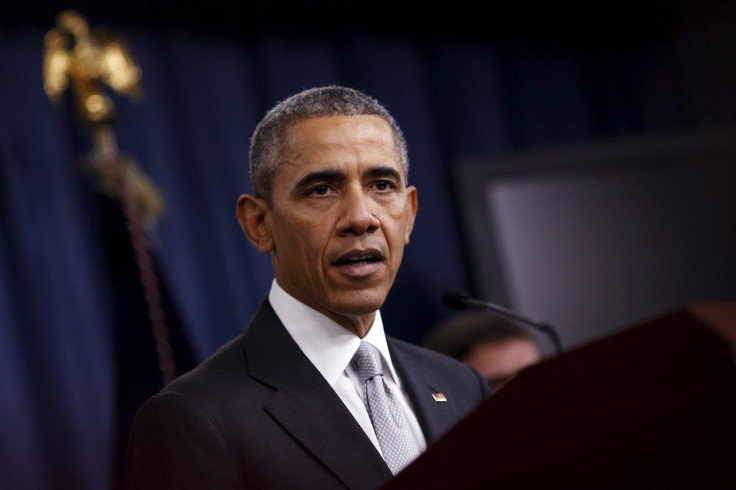Obama ISIS Speech: President Warns Islamic State Group Leaders: 'You Are Next'

President Barack Obama increased his warning against the Islamic State group Monday, vowing to further erode its territorial gains in Iraq and Syria and go after more of its leaders. He said U.S. airstrikes dropped more bombs on the terrorist organization, aka ISIS and ISIL, last month than in any month since the start of the campaign.
“ISIL leaders cannot hide, and our message is simple: You are next,” Obama said. He added that the U.S. had conducted nearly 9,000 airstrikes against ISIS as of Monday. “As we squeeze its heart we’ll make it harder for ISIL to pump its propaganda to the rest of the world,” he said.
Obama also emphasized that he wanted other countries in the Middle East to continue supporting the U.S. and its allies in their campaign against ISIS. He said Secretary of Defense Ash Carter would be headed to the Middle East directly after the president finished speaking to secure more support for efforts in Syria and Iraq.
“So far ISIL has lost about 40 percent of the populated areas it once controlled in Iraq, and it will lose more,” Obama said.
He concluded by focusing on protection at home, saying the Department of Homeland Security is updating its alert system to help the people "stay vigilant and safe."
Obama's statement came after a National Security Council meeting at the Pentagon that was part of a weeklong series of events aimed at trying to calm Americans’ fears of terrorism before the holiday season. During the National Security Council meeting, the president was expected to receive an update on “ways to further enhance our campaign to degrade and destroy the terrorist group,” according to the White House. This week, Obama will visit the National Counterterrorism Center, where he will be updated on threat assessments as he is every year before the holidays.
White House press secretary Josh Earnest said Obama did not plan to announce any new changes Monday, the Associated Press reported. “If there's an opportunity for us to intensify efforts behind one aspect of our strategy, then that is something that he wants his team to be prepared to do,” Earnest said.
Americans have been feeling a heightened sense of danger in recent weeks after deadly terror attacks in Paris and San Bernardino, California. Nearly 80 percent of Americans said they believed a terrorist attack is at least somewhat likely in the next few months, a New York Times/CBS poll found last week.
U.S. officials have continued to say there are no specific, credible threats to the United States, but the lack of warning before San Bernardino exacerbated concerns about how the U.S. handles terror attacks. Republicans around the country have tried to stop the U.S. from accepting Syrian refugees, many of whom are Muslim, out of the fear that would-be terrorists could sneak into the country. Others have called for a tightening of U.S. visa laws, particularly after it was reported that one of the San Bernardino shooters came to the U.S. from Saudi Arabia on a “fiancé visa,” which allows people to enter the country and marry a U.S. citizen within 90 days.
National security has become a prominent focus in the 2016 presidential race, and many of the Republican candidates have harshly criticized the Obama administration’s strategy for combatting ISIS. So far, Obama has not announced any major changes to his strategy and has opted instead for reassuring the American people that his government is following its course to prevent future attacks. He has also tried to use his announcements to counter inflammatory ideas such as Republican front-runner Donald Trump’s proposal to ban Muslims from entering the U.S.
“Terrorists like ISIL are trying to divide us along lines of religion and background,” Obama said Saturday in his weekly address. “That's how they stoke fear. That's how they recruit.”
© Copyright IBTimes 2024. All rights reserved.






















